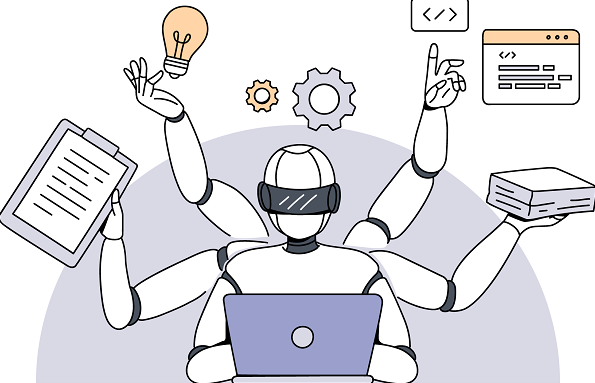Which AI skills do organisations need the most?

Generative AI was the biggest tech news story of 2023… and 2024 is all about the adoption of this technology. But which skills are in most demand? And how can organisations nurture the skills required to make the most of the new, game-changing tools?
The freelance marketplace Upwork found that AI jobs were the fastest growing category on its platform in 2023. Between the last quarter of 2022 and the second quarter of 2023, posts for generative AI jobs increased more than 1,000 percent.
In-demand AI skills
According to Upwork analysis of activity on the platform, the most in-demand AI skills are:
• Chat GPT
• Natural Language Processing
• TensorFlow
• Image Processing
• PyTorch
• AI content creation
• Midjourney
• AI chatbot
• Model tuning
• Stable Diffusion
Some of these in-demand skills relate to specific technologies, such as TensorFlow and PyTorch – two machine learning frameworks used to train models and developed by Google and Facebook respectively. Similarly, Midjourney and Stable Diffusion are specific tools, used for image creation.
Other skillsets on the Upwork list are more generic. Natural Language Processing, AI chatbot and model tuning require a range of skills – from software development, through data architecture and analytics, through model training, optimisation and operation.
More than technical skills
While it is tempting to focus on the technologies being used and the technical skills required to successfully use them, the former world chess champion Garry Kasparov has pointed out that “winning performance doesn’t not come from combining the best technology with the best people, but from the best process of combining”.
As Harvard Business Review explains, “The current hype cycle is around AI capability, digital skills and the need for organisational change management, but our current finding reveals the importance of specific human capabilities to the successful use of AI.” This includes the ability to combine people and technology effectively, the interpersonal skills associated with that and the requisite domain expertise.
The need to retain domain expertise
As AI takes on more tasks within an organisation, there is a risk that one of the organisation’s greatest assets – its people’s expertise and domain knowledge – will be lost. This is a problem, HBR explains, because AI models are known to “hallucinate” inaccurate results from time to time. It warns, “inexperienced employees may not be discerning enough” to sort fact from hallucination.
Organisations need to develop strategies around their AI use which enable them to retain and develop their specialist domain knowledge, despite the reliance on AI tools. HBR likens the necessity to that of an airplane. When something goes wrong, the autopilot is turned off and the pilots need to know what to do. Developing and maintaining those skills is essential.
It is possible that AI could be both problem and solution here. AI could be used to streamline the development and retention of this knowledge and expertise. For example, McKinsey suggests that “a chatbot could guide new employees through training… at their own pace, on their own terms, allowing them to increase the extent and speed of their learning”. Kasparov’s notion of “the best process of combining” seems particularly pertinent here.
Nurturing “softer” interpersonal skills
In addition to the technical skills of cloud engineering and infrastructure architecture, data strategists, data architects and data analysts, McKinsey also argues that social and emotional skills are likely to be more in demand.
Data inputting and basic processing tasks, which require only basic cognitive skills, are likely to be particularly affected by automation, says McKinsey. It estimates demand for such skills will fall by 23 percent across Europe by 2030. In contrast, demand for communication and social skills are anticipated to rise by 22 percent. The fastest demand growth is expected to be seen in entrepreneurship and initiative taking, with a 32 percent increase.
These skills are important in the use and application of AI technologies. In its Enabled by AI, driven by people report, McKinsey recommends that “employees and managers should have a clear understanding of gen AI’s strengths and weaknesses and how use of the technology is linked to the organisation’s strategic objectives”.
These skills will also be crucial in maximising the human potential freed from mundane, repetitive work by AI. As McKinsey posits, “imagine, for example, a world with fewer meetings and more time to think”.
What now?
Is your business ready to explore the new possibilities created by gen AI? Would you like support putting the necessary governance, IT and data infrastructure and AI tools in place?
Call us: 0808 164 4142
Message us: https://www.grantmcgregor.co.uk/contact-us
Further reading
You can find additional technology topics on our blog:
• AI’s new role in cyber security
• How long would it take your organisation to detect a data breach?
• Do your backups include this important information?
• Cyber Crime on the rise: how can you protect your organisation from it?
• Is your organisation doing enough on supply chain security?




